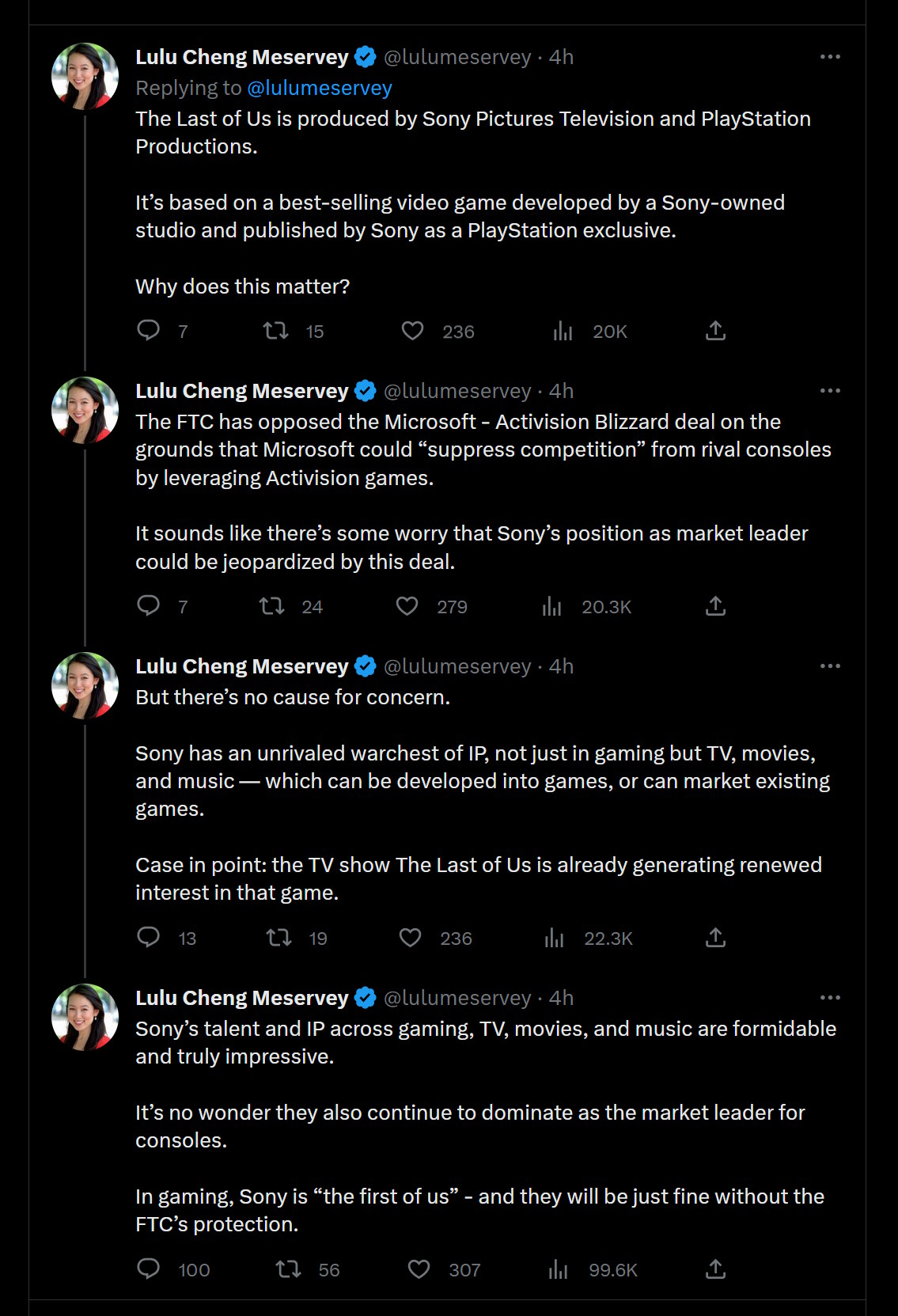Activision Blizzard exec says The Last of Us' success on HBO proves the Microsoft buyout should go through
Lulu Cheng Meservey sent a message to the FTC after the most recent episode of The Last of Us on HBO.

Activision Blizzard chief communications officer Lulu Cheng Meservey says the success of The Last of Us on HBO is proof positive that Microsoft's acquisition of Activision Blizzard should be allowed to proceed.
HBO's The Last of Us adaptation is a massive hit, and not just by the relatively low game-to-film standards we've grown used to. Multiple sites described the series as "the best videogame adaptation ever" when it premiered earlier this month, and it holds an enviable 97% critical rating on Rotten Tomatoes. And it's not just for game fans: Esquire called the most recent episode "a TV moment we'll never forget," and it's sparked serious talk about Emmy and Golden Globe contention for supporting actor Nick Offerman.
That success prompted Meservey to speak up, and specifically to ask the FTC if it had caught the most recent episode and note that it is "a true blockbuster, watched by tens of millions."
"If you haven’t already, you should check it out," Meservey tweeted. "You may be particularly interested in the fact that The Last of Us is produced by Sony Pictures Television and PlayStation Productions. It’s based on a best-selling video game developed by a Sony-owned studio and published by Sony as a PlayStation exclusive."
Hi @FTC — did you catch last night’s episode of The Last of Us? It was incredible.No wonder the show is breaking records. It’s a true blockbuster, watched by tens of millions.If you haven’t already, you should check it out. You may be particularly interested in the fact that pic.twitter.com/MhcT0DmOsMJanuary 30, 2023
After asking rhetorically why all of that matters, she went on to explain that the FTC is opposing Microsoft's acquisition of Activision Blizzard because of concerns that it might "suppress competition" by making the studio's games—particularly the Call of Duty series—Xbox exclusives. But the success of The Last of Us show demonstrates that there's nothing to worry about, because "Sony has an unrivalled warchest of IP, not just in gaming but TV, movies, and music—which can be developed into games, or can market existing games."
"Sony’s talent and IP across gaming, TV, movies, and music are formidable and truly impressive," Meservey tweeted. "It’s no wonder they also continue to dominate as the market leader for consoles. In gaming, Sony is 'the first of us'—and they will be just fine without the FTC’s protection."
The implication that Sony is the real dominator is not exactly subtle, but what I find especially interesting is the way Meservey's message deviates from the official Microsoft line: Not that it won't make Call of Duty a console exclusive, but that it wouldn't be a big deal if it did because Sony is awash with its own powerful (and, let us not overlook, exclusive) properties.
The biggest gaming news, reviews and hardware deals
Keep up to date with the most important stories and the best deals, as picked by the PC Gamer team.

It's an interesting position for Activision Blizzard's official comms boss to take, and it prompted mostly negative reactions on Twitter. Some respondents are supportive, but a majority seem to take issue with the comparison: Several question the relevance of the statement, noting that Microsoft's Halo series on Paramount Plus was also a hit (although not nearly as good); at least one pointed out that even in a direct game-to-game comparison, The Last of Us—of which there are two—is completely different from the annualized Call of Duty series. I don't know if those arguments are especially well-formed either, but clearly there are a lot of gamers who don't want to see Microsoft own Activision Blizzard.
This isn't the first time Meservey has run into trouble on Twitter: She also came under fire in October 2022 over her opposition to unionization at Activision Blizzard.

Andy has been gaming on PCs from the very beginning, starting as a youngster with text adventures and primitive action games on a cassette-based TRS80. From there he graduated to the glory days of Sierra Online adventures and Microprose sims, ran a local BBS, learned how to build PCs, and developed a longstanding love of RPGs, immersive sims, and shooters. He began writing videogame news in 2007 for The Escapist and somehow managed to avoid getting fired until 2014, when he joined the storied ranks of PC Gamer. He covers all aspects of the industry, from new game announcements and patch notes to legal disputes, Twitch beefs, esports, and Henry Cavill. Lots of Henry Cavill.

